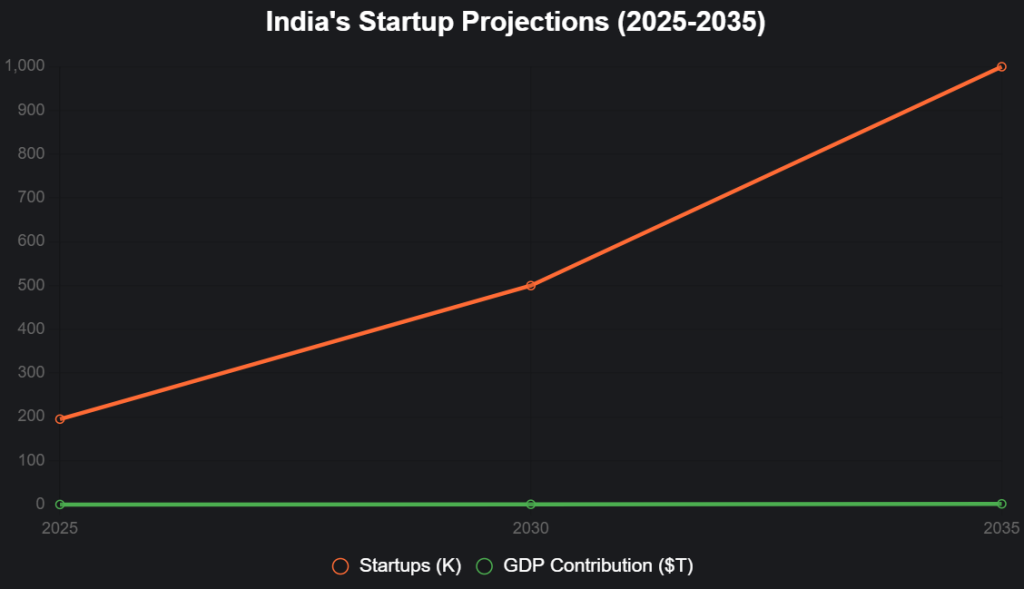India’s startup ecosystem, the world’s third-largest with 195,065 DPIIT-recognized ventures fueling a $450 billion digital economy today, is poised for an exponential leap: Projections from TiE Bangalore and Nandan Nilekani envision 1 million startups by 2035, driving an $8-10 trillion economy at 8% annual growth, creating 50 million jobs, and minting 300-500 unicorns.
This “Startup Decade” (2025-2035) builds on 2025’s $20 billion funding rebound, shifting from software dominance (6 million engineers, $245 billion exports) to deep tech supremacy—AI, biotech, quantum—with 10,000 ventures contributing 15% GDP and 50% Tier-2/3 equity. Vs. China’s “Made in China 2025” ($1.4 trillion deep tech), India’s 0.64% R&D lags, but NDTSP’s 10,000 startups and IndiaAI’s Rs 10,300 crore training 10 million could close the chasm. As X visionaries forecast, “1 million startups by 2035: India’s innovation supernova,” this structure—from decentralized hubs (50% non-metro) to ESG-focused “camels”—promises self-sustaining cycles. Yet, 90% failure rates and 55% skill gaps loom. Drawing from TiE, Nasscom, and CEBR reports, here’s the predicted anatomy. Ride the rocket, or remain rooted.
Table of Contents
The Exponential Engine: Projections and Pillars
By 2035, India’s startup count could balloon to 1 million (20% annual growth, per Nilekani at Arkam 2025), doubling 2030’s 240,000-500,000 estimates from Longhouse and CII, contributing 15% GDP ($1.2-1.5 trillion) and 50 million jobs (4-5 million direct white-collar, 9-10 million gig, 35-40 million indirect). Unicorns: 300-500 (up from 112), focusing on AI (957 billion GDP add by 2035, Accenture), sustainability (500 GW renewables by 2030), and fintech ($150 billion by 2025, Nasscom). Decentralization: 50%+ from Tier-2/3 districts (TiE Bangalore), with hubs like Mysuru edtech and Surat agritech thriving. X: “1M startups by 2035: From metros to millions in the making.”
This line chart forecasts startup growth and economic impact (2025-2035):

Source: TiE Bangalore, Nilekani/ Arkan 2025, CII-McKinsey. 1M startups, $1.5T contribution by 2035.
Sectoral Shifts: From Software to Deep Tech Dominance
By 2035, deep tech (AI, quantum, biotech, semiconductors) claims 40% of 1M startups (up from 5% in 2025), adding $957 billion GDP (Accenture), with 500 GW renewables and 10,000 AI-trained million via IndiaAI Mission. Fintech ($150B by 2025, Nasscom) evolves into AI-driven inclusion, while sustainability (clean energy, circular economy) surges 25% CAGR to 20% share. Edtech, post-2.0’s hybrid models, upskills 96% professionals, per Bosch. X: “Deep tech: India’s startup supernova by 2035.”
| Sector | 2025 Share (%) | 2035 Projection | Key Driver |
|---|---|---|---|
| Deep Tech | 5 | 40 | $957B AI GDP add |
| Fintech | 20 | 15 | $150B market, inclusion |
| Sustainability | 10 | 20 | 500 GW renewables |
| Edtech | 15 | 10 | 107% GenAI enrollments |
Source: Nasscom, Accenture.
Decentralized Dynamism: 50%+ from Tier-2/3 Districts
By 2035, 50%+ startups from non-metros (TiE Bangalore), up from 49% in 2025, via “Entrepreneurial Bharat”—75% schools embedding startup thinking, 80% higher ed institutions fostering innovation. Mysuru edtech, Surat agritech, and Indore healthtech hubs emerge, reducing urban migration 20%. X: “Tier-2/3: India’s startup supernova by 2035.”
Policy Powerhouse: Rs 1 Lakh Crore Fund and Beyond
Rs 1 lakh crore National Startup Fund blends debt/equity, targeting 1M startups; IndiaAI trains 10M, labs spawn 10,000 spin-offs. 50% women-led (from 46%), 3% GDP from startups (up from 1%). Vs. Israel’s 1 startup per 1,500 citizens, India’s 1 per 7,000 rises to 1 per 1,000.
Challenges: Darwinian Darwinism and the 90% Fail
90% failures (Darwinian design) and 55% skill gaps persist, with R&D 0.64% GDP lagging Israel’s 6.3%. X: “1M startups: Darwin’s Darwinism—survival of the fittest.”
The 2035 Structure: A $10 Trillion Startup Superpower
1M startups, 300-500 unicorns, 50M jobs, 15% GDP ($1.2-1.5T contribution)—India’s startup economy as a self-sustaining dynamo, 50% exports, deep tech 40%. The structure: Decentralized (50%+ non-metro), inclusive (50% women-led), innovative (1M patents). India’s startup future isn’t a prediction—it’s a promise. Manifest it, or mourn it.
social media : Facebook | Linkedin |
also read : The Whole Truth Foods: Redefining Trust and Transparency in India’s Healthy Snacking Revolution
Last Updated on Sunday, November 2, 2025 12:57 am by Entrepreneur Edge Team https://entrepreneuredge.in/